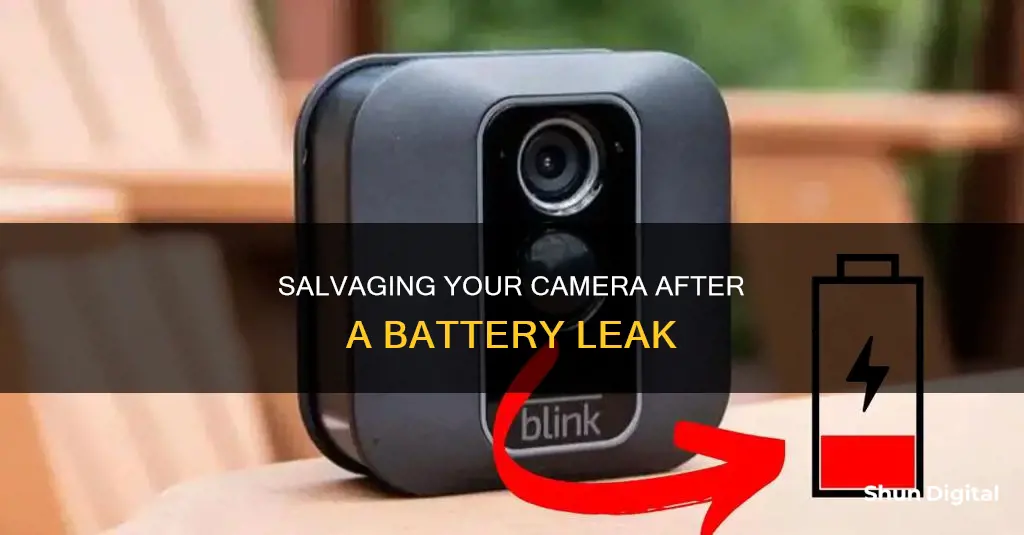
If you discover that a battery has leaked in your camera, it's important to act quickly to prevent further damage. Keep calm and avoid touching the battery fluid, as it can cause skin irritation and even severe damage if it comes into contact with your eyes or mouth. Wear disposable gloves and remove the battery from the camera, being careful not to let any additional fluid leak out. Place the leaking battery in a clear plastic bag and secure it out of reach. Next, you'll want to clean the affected areas of your camera. You can use a damp cloth or cotton swab dipped in vinegar or lemon juice to gently wipe away any residue. Be careful not to scrub too hard, as you could damage the device. If there is corrosion, you may need to use a pencil eraser or sandpaper to remove it. Once you've cleaned the camera, install new batteries and turn it on. If it still doesn't work, you may need to disassemble the camera to check for internal damage.
What to do if a battery has leaked in a camera
| Characteristics | Values |
|---|---|
| First steps | Keep calm, put on gloves and ensure the room is well-ventilated |
| Remove the battery | Take out the leaking batteries from their compartments and put them in a clear plastic bag |
| Store the battery | Put the bag in a secure place, out of reach of children and pets, and take it to a collection point as soon as possible |
| Clean the device | Use lemon juice, vinegar, or isopropyl alcohol to gently wipe off any residue from the device |
| Corroded areas | Sand down any corroded areas to avoid permanent damage and remove any residual electrolytes |
| Battery disposal | Do not dispose of batteries in household waste, take them to a designated collection point |
What You'll Learn

Wear gloves and an apron to protect your skin and clothing
If you discover a leaking battery in your camera, it is important to take precautions to protect your skin and clothing from the corrosive chemicals. The leaking fluid can cause anything from minor irritation and reddening of the skin to more severe damage, so it is crucial to take the appropriate measures.
Before you begin, make sure to wear gloves and an apron. The gloves should be disposable, as the acid in the battery fluid can permanently damage the material. Despite their thinness, disposable gloves are sufficient to protect your hands from harm. In addition to gloves, an apron will safeguard your clothing from stains and your skin from irritation. It is also recommended to work in a well-ventilated area and keep out of the reach of children or pets.
Once you are properly equipped with gloves and an apron, you can proceed to remove the leaking batteries from the camera. This task may be more challenging than usual, but the batteries should come out with some effort. Place the leaking batteries in a clear plastic bag, which will indicate that they are damaged and require careful handling. Secure the bag in a safe location, away from the reach of children or pets.
After removing the batteries, you can begin cleaning your camera. Dip a cotton swab or cloth in lemon juice or vinegar, and gently wipe down any affected areas. Be cautious not to scrub too vigorously, as you could damage the device. If the circuit board of your camera has been damaged by the battery leak, it may no longer work properly. In such cases, it is advisable to take your camera to a specialist for further assessment and repair.
By following these steps and taking the necessary precautions, you can effectively address a leaking battery in your camera while ensuring the safety of your skin and clothing.
Charged Camera Battery: Know-How
You may want to see also

Remove the leaking batteries
If you discover a leaking battery inside your camera, it is important to act quickly and calmly to avoid damage to your device and harm to yourself. Here is a step-by-step guide on how to remove the leaking batteries safely:
Protect Yourself
Before you begin, it is crucial to take the necessary precautions to protect yourself from the harmful chemicals in the leaking batteries. Put on disposable gloves to avoid direct contact with the battery fluid, which can cause skin irritation or, in severe cases, damage to the mucous membrane. Ensure that you are working in a well-ventilated area to avoid inhaling any fumes. If possible, wear a respirator or a mask to protect yourself further. Keep children and pets away from the work area to prevent accidental exposure.
Now, carefully remove the leaking batteries from the camera's battery compartment. This may be more challenging than usual due to the corrosion, but gently work the batteries out of their compartments. Try not to tilt the batteries to prevent further leakage. Place the leaking batteries in a clear plastic bag so that they are visible, indicating they should be handled with care. Secure the bag and keep it out of the reach of children and pets.
Clean the Camera's Battery Compartment
Once the leaking batteries have been removed, it is time to clean the battery compartment in your camera. Dip a cotton swab or a soft cloth in vinegar, gently wiping away any residue or corrosion from the compartment. Be careful not to scrub too hard, as you do not want to damage the camera's interior. You can also try using a pencil eraser or a fibreglass cleaning pen to remove any remaining corrosion. Ensure that you dispose of the used vinegar-soaked materials safely.
Dispose of the Leaking Batteries
After removing the batteries from your camera, it is essential to dispose of them properly. Do not throw them away with your regular trash. Instead, take them to a designated collection point for leaking or damaged batteries. Many supermarkets and electronics stores have collection points for used batteries. Alternatively, you can contact your local waste management authority for guidance on proper disposal methods.
Remember, always handle leaking batteries with caution and prioritize your safety and the safety of those around you.
Simplisafe Camera Costs: When Do You Get Charged?
You may want to see also

Clean the device with vinegar
If you discover a leaking battery in your camera, the first thing to do is to put on gloves to protect your skin from irritation and stains. It's also important to ensure that the room you're working in is well-ventilated.
Once you've removed the leaking battery from the camera, you can start cleaning the device with vinegar. Here's a step-by-step guide:
- Prepare a mixture of equal parts white vinegar and water. White vinegar is ideal for cleaning corrosion due to its acetic acid content, which effectively breaks down the corrosive substances.
- Soak a cloth or cotton swab in the diluted vinegar solution. Make sure the cloth or swab is damp but not overly wet to avoid getting the camera too wet. Wring out the excess liquid if needed.
- Gently wipe the affected areas of the camera's battery compartment with the damp cloth or swab. Pay close attention to any greenish or white crystalline crust, as these are signs of corrosion.
- Allow the vinegar solution to sit on the corroded areas for a few minutes. You may notice a fizzing or bubbling reaction, which is normal.
- After a few minutes, gently scrub the corrosion away with a soft-bristled toothbrush or a clean cloth. Be careful not to scrub too vigorously, as you don't want to damage the device.
- Once you've removed the corrosion, use a clean, water-soaked cotton swab or cloth to rinse and wipe the area, ensuring no vinegar residue is left behind.
- Let the battery compartment air-dry completely before inserting new batteries.
By following these steps, you can effectively clean your camera's battery compartment with vinegar and restore it to a usable state. Just make sure to handle the process with care and always prioritize your safety when dealing with leaking batteries.
Charging Camera Batteries: Alone Contestants' Strategies
You may want to see also

Sand off corroded areas
If you notice a greenish discolouration on parts of your camera, it means that the contacts have been corroded by battery acid. To avoid permanent damage, you must sand down the affected areas and remove any residual electrolytes.
Before you begin, make sure to put on protective gear, such as rubber gloves and a mask. Safety goggles are also recommended to protect your eyes from any debris. Use fine-grit sandpaper or an emery board to gently sand off the corrosion. Be careful not to apply too much pressure, as you could damage the circuitry of your camera.
Once you have removed the corrosion, clean the area with a damp cloth to remove any remaining residue. You can also use a cotton swab or Q-Tip dipped in isopropyl alcohol, vinegar, or lemon juice to neutralise the affected areas. For stubborn spots, try scrubbing with a toothbrush. Finally, dry the area thoroughly before installing new batteries and powering up your camera.
Vicohome Camera Charging: A Step-by-Step Guide
You may want to see also

Dispose of the leaking battery
If you discover a leaking battery in your camera, it's important to take the necessary steps to dispose of it properly. Here's a detailed guide on how to do it safely:
Put on Protective Gear
Before handling the leaking battery, it's crucial to wear protective gear to shield your skin and eyes from potential irritation. Put on rubber gloves, safety goggles, and even a mask if you have one. The chemicals in the leaking battery can be harmful, so it's better to be cautious.
Remove the Leaking Battery
Using your gloved hand, carefully take out the leaking battery from the camera's battery compartment. Place the battery in a clear plastic bag. This serves two purposes: it contains the leak and clearly signals that the battery is damaged and requires careful handling.
Secure the Bag
Place the bag containing the leaking battery in a secure location, preferably locked away, and out of the reach of children and pets. Keep it away from flammable materials and other electronics.
Find a Designated Collection Point
Do not throw the leaking battery into the regular trash. Instead, locate a nearby collection point that accepts damaged batteries. These collection points are often found in supermarkets, and some organisations, like Bebat in Belgium, have thousands of collection points.
Transport the Battery Safely
As soon as possible, transport the leaking battery to the collection point. If you must store it temporarily, ensure it remains secure and out of reach. Do not leave it in your car, as extreme temperatures can further damage the battery.
Environmental Precautions
Battery acid can contaminate groundwater and soil, posing a danger to plants, animals, insects, and ultimately, humans. Therefore, it is imperative to dispose of leaking batteries properly and never throw them into nature or regular trash bins.
In summary, disposing of a leaking battery from your camera requires careful handling, protective gear, and proper disposal at designated collection points. Always prioritise safety and environmental responsibility when dealing with leaking batteries.
Traveling with Camera Batteries: A Guide to Safe Packing
You may want to see also
Frequently asked questions
If a battery leaks in your camera, the first thing to do is remain calm and avoid touching the leaking fluid, as it can cause anything from minor irritation to severe damage. Next, put on gloves and remove the battery from the camera. Then, clean the affected area with a damp cloth or cotton swab dipped in vinegar or lemon juice. Finally, install a new battery and turn on the camera.
A leaking battery may exhibit a chemical smell or a liquid or dried white substance on the outside of the battery.
When cleaning a leaking battery, it is important to wear gloves and work in a well-ventilated area. Use a damp cloth or cotton swab dipped in vinegar or lemon juice to gently wipe away any residue.







